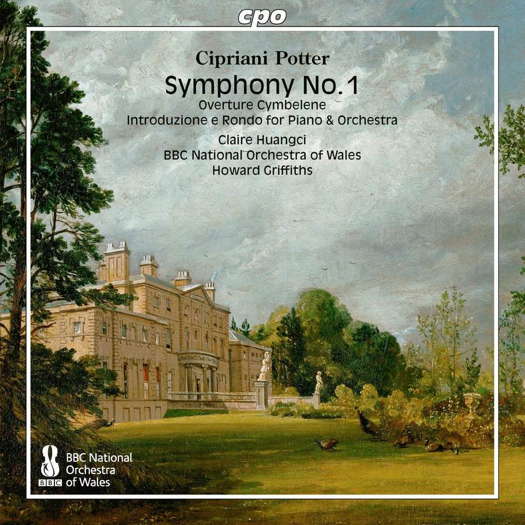- Viktor Ullmann: The Emperor of Atlantis
- Indiana University
- Clarence Barlow
- Hans Werner Henze
- Lincolnshire
- Siqian Li
- Choir of York Minster
- Giulio Arnofi

Truly Revelatory
Music by English composer Cipriani Potter, highly recommended by GERALD FENECH
'Howard Griffiths and his BBC National Orchestra of Wales players deliver electrifying performances full of rhythmic vitality and lyrical warmth ...'
Born in London on 3 October 1792, Cipriani Potter was the son of a piano teacher, who was also the first instructor of the young boy. Cipriani was named after his godmother who was a sister of Giovanni Battista Cipriani. After further lessons from Thomas Attwood and William Crotch, the youthful composer attempted one of his very first compositions, an overture, which was performed at a Philharmonic concert in 1816. Frustrated by a lack of opportunities in England, Potter travelled to Vienna in 1817, where he met Beethoven, who advised him to continue his studies with Aloys Forster. In 1819 Potter returned to England, where very soon he built a reputation both as a pianist and conductor. Indeed he was responsible for the British premiere of several Mozart piano concertos and Beethoven's first, third and fourth piano concertos, not to mention that he was also the conductor in the premiere of Mendelssohn's G minor piano concerto with the composer at the keyboard.
In 1822 Potter began teaching at the newly founded Royal Academy of Music, where in 1832 he became Principal of the same Academy till 1859. Round about this time he started to devote his energies to his educational work and preparing editions of Mozart and Beethoven keyboard music; consequently composition came almost at a standstill. He did, however, maintain a keen interest in new music on the continent, and in 1871 he gave the British premiere of Brahms' German Requiem arranged for piano duet, in which he was partnered by Kate Loder.
Highly esteemed, Cipriani Potter left behind a rich body of music, among which we find nine extant symphonies, four piano concertos, some chamber music and several pieces for solo piano. Aside from a cantata and a handful of songs, Potter composed no vocal music. He died aged seventy-nine on 26 September 1871. Potter was England's first composer of note to write symphonies after experiencing Mozart's late works and Beethoven's orchestral music.
His First Symphony in G minor was premiered on 29 May 1826, and from the very first Allegro con spirito there is already the dramatic instinct of a composer whose preferred works were those cited above. This first movement is a bold stroke of genius, abounding in melodic invention and skilful thematic workmanship, and the work reflects the overall design of Mozart's final two symphonies.
Listen — Cipriani Potter: Allegro con spirito (Symphony No 1)
(track 1, 0:04-1:03) ℗ 2021 cpo :
Indeed, the delightful Andante leads straight away to a sprightly minuet.
Listen — Cipriani Potter: Andante - Tempo di Minuetto (Symphony No 1)
(track 2, 4:34-track 3, 0:18) ℗ 2021 cpo :
The closing Allegro non tanto is somewhat restrained but certainly not short on sunny moments. No need to emphasize the fact that the premiere was a great success.
The Introduzione e Rondo (alla militaire) in E flat for piano and orchestra is typical of a phenomenal pianist at the height of his powers. Composed in 1827, this spectacular piece is a delight for the ears that displays what many have described as Potter's vein of humour, and while the mood of the Maestoso introduction – now ponderous, now playful – continues in the 'military rondo', the work is punctuated by at least two musical jokes that give it a genuine air of wistful fun.
Listen — Cipriani Potter: Rondo (Introduzione e Rondo (alla militaire))
(track 6, 12:56-13:56) ℗ 2021 cpo :
The Overture to Shakespeare's Cymbeline was premiered in London in April 1837. Like Anthony and Cleopatra and The Tempest, it is one of Potter's final compositions. Cymbeline is one of the most complex and convoluted plays Shakespeare ever wrote. The plot, set in the age of wars between Britons and Romans in the first century AD, tells a story of violence and calumny, and like Beethoven thirty years earlier in his Coriolan Overture, Potter found the perfect stimulus to write a character piece in which conflicts are depicted for purposes of kindling particular ideas and associations. The piece has a moving main theme akin to Berlioz's idee fixe, as well as turbulent drama, restless dreams and a triumphant conclusion.
Listen — Cipriani Potter: Overture to Cymbelene
(track 7, 14:25-15:07) ℗ 2021 cpo :
Howard Griffiths and his BBC National Orchestra of Wales players deliver electrifying performances full of rhythmic vitality and lyrical warmth, and their sympathetic support to American pianist Claire Huangci in the Introduzione and Rondo is commendable throughout. A truly revelatory disc which should enhance no end the fortunes of a still neglected but very fine English composer. Highly recommended.
Copyright © 20 May 2021
Gerald Fenech,
Gzira, Malta

CD INFORMATION - CIPRIANI POTTER: SYMPHONY NO 1




